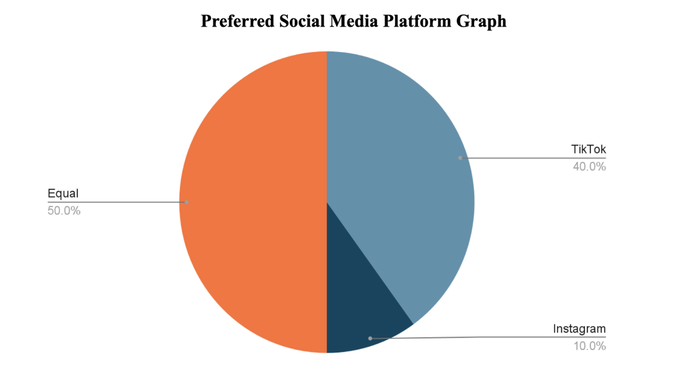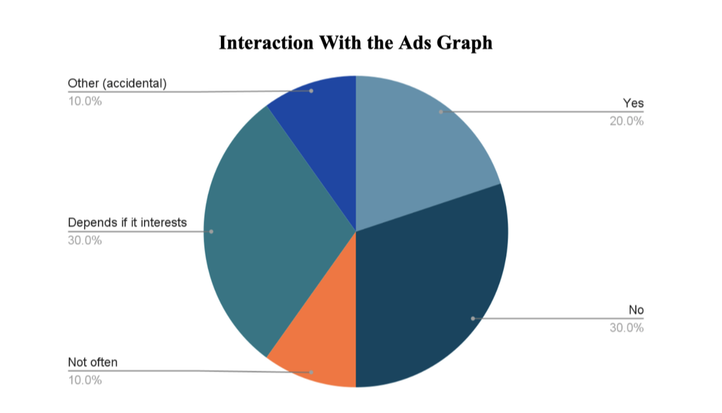The Success of Clothing Ads on TikTok and Instagram
By Laura Charleston
November 28, 2022
Image Credit: dole777 for Unsplash
After liking videos or posts about clothes, magically, an advertisement about it will pop up. But it’s not magic or an FBI agent stalking you, it’s all a part of the algorithm and personal data. Yet how successful is it? Does it reach its target audience? Will you actually buy from them?
Online shopping dates back to 1979 when Michael Aldrich, an English inventor, and entrepreneur, invented online transactions for consumers and businesses to track purchases. Since then, technological advancements have skyrocketed the eCommerce industry. Advancements include PayPal, Google Ads, Google Wallet, Apple Pay and more.
Fashion and Apparel are leading the eCommerce industry. As of October 2022, Shein is the world's top website for fashion and apparel, according to similarweb.com. Nike came in second, and H&M came in third. These companies strive to maintain a solid online presence to grow their audience.
Advertisements use relevancy to locate their targeted audience. Instagram states in its policy that they collect personal data to show ads relevant to the user. Personal data includes recent activity and interests. A platform based on not only posts but also stories and reels has many opportunities to gather information. Following influencers who promote apparel will increase the chances of the user seeing apparel advertisements.
TikTok does the same thing. Their policy states that they use consumer’s information for relevant ads, among other reasons. Compared to Instagram, their platform is video and story-based. The viewers scroll through time-limited videos catered to the interests the user selected upon creating the account.
We conducted a survey to see how successful clothing ads are on TikTok and Instagram. A few questions from the survey are listed below.
“How often do you see clothing ads?”
“Have you clicked and explored any clothing ads on your preferred social media platform?”
“Have you purchased from clothing ads before on your preferred social media platform?”
“Are you more inclined to buy clothing an influencer you follow advertises?”
The participants were asked what their preferred social media platform was, and they answered accordingly. Participants who prefer both platforms chose ‘equal.’
Online shopping dates back to 1979 when Michael Aldrich, an English inventor, and entrepreneur, invented online transactions for consumers and businesses to track purchases. Since then, technological advancements have skyrocketed the eCommerce industry. Advancements include PayPal, Google Ads, Google Wallet, Apple Pay and more.
Fashion and Apparel are leading the eCommerce industry. As of October 2022, Shein is the world's top website for fashion and apparel, according to similarweb.com. Nike came in second, and H&M came in third. These companies strive to maintain a solid online presence to grow their audience.
Advertisements use relevancy to locate their targeted audience. Instagram states in its policy that they collect personal data to show ads relevant to the user. Personal data includes recent activity and interests. A platform based on not only posts but also stories and reels has many opportunities to gather information. Following influencers who promote apparel will increase the chances of the user seeing apparel advertisements.
TikTok does the same thing. Their policy states that they use consumer’s information for relevant ads, among other reasons. Compared to Instagram, their platform is video and story-based. The viewers scroll through time-limited videos catered to the interests the user selected upon creating the account.
We conducted a survey to see how successful clothing ads are on TikTok and Instagram. A few questions from the survey are listed below.
“How often do you see clothing ads?”
“Have you clicked and explored any clothing ads on your preferred social media platform?”
“Have you purchased from clothing ads before on your preferred social media platform?”
“Are you more inclined to buy clothing an influencer you follow advertises?”
The participants were asked what their preferred social media platform was, and they answered accordingly. Participants who prefer both platforms chose ‘equal.’
Between both TikTok and Instagram, it is not usual for participants to pay attention to apparel ads. 50% of participants prefer TikTok and Instagram. 40% prefer TikTok. 10% prefer Instagram. It was less likely among TikTok individuals.
Freshman economic major Laura Fuentes prefers TikTok over Instagram for popular sounds and entertainment.
“TikTok is videos. So I'm constantly hearing things, and I like that,” she said.
Junior neuroscience major Grace Harlan commented on the survey, “ For Instagram, I’m usually seeing what people are up to and posting/checking what people are interacting with my profile. I use TikTok purely for entertainment.”
Freshman economic major Laura Fuentes prefers TikTok over Instagram for popular sounds and entertainment.
“TikTok is videos. So I'm constantly hearing things, and I like that,” she said.
Junior neuroscience major Grace Harlan commented on the survey, “ For Instagram, I’m usually seeing what people are up to and posting/checking what people are interacting with my profile. I use TikTok purely for entertainment.”
20% of the total participants voted Yes; they did click and explore the brands. These individuals also preferred both TikTok and Instagram. 30% voted No, and one individual preferred TikTok while the rest were equal-preferring. The other 30% voted Depends if it interests me. Each individual was either TikTok, Instagram, or Equal preferring. Other participants stated they accidentally clicked on the ads, which occurred to one TikTok-preferring participant.
Some viewers find the ads annoying and do not want to see them. When asked if she paid attention to the advertisements, freshman computer science major Alyssa Hutchinson stated, “No, not at all…I wish they’d go away.”
Compared to Grace Harlan, who is more interested in the ads, “ Sometimes they do get to me because I’m on Instagram a lot and a lot of the accounts I follow are aesthetic and fashion based.” Due to her following, Instagram knows specifically what apparel ads will interest her more.
Fuentes specified she does not care for fast fashion companies, such as Shein or Cider. “Those stores that are obviously scamming the designs of other artists for cheaper, like Shein and some obscure online store you’ve never heard of, those. I don’t pay attention to those,”
But when it came to purchasing from the ads, everyone said no. If they were advertised by an influencer, the answer changed to maybe, but in all, the response was no.
Clothing ads have some skepticism attached to them. Whether it is genuine, ethical, or a scam is always on the viewer’s mind. Other times consumers want to be entertained, ignoring the ads when they pop up. It is challenging to maintain viewers’ attention and even more to have them purchase from the business.
The Campus Trainer has permission from Laura Charleston to use the pie charts from the survey.
Some viewers find the ads annoying and do not want to see them. When asked if she paid attention to the advertisements, freshman computer science major Alyssa Hutchinson stated, “No, not at all…I wish they’d go away.”
Compared to Grace Harlan, who is more interested in the ads, “ Sometimes they do get to me because I’m on Instagram a lot and a lot of the accounts I follow are aesthetic and fashion based.” Due to her following, Instagram knows specifically what apparel ads will interest her more.
Fuentes specified she does not care for fast fashion companies, such as Shein or Cider. “Those stores that are obviously scamming the designs of other artists for cheaper, like Shein and some obscure online store you’ve never heard of, those. I don’t pay attention to those,”
But when it came to purchasing from the ads, everyone said no. If they were advertised by an influencer, the answer changed to maybe, but in all, the response was no.
Clothing ads have some skepticism attached to them. Whether it is genuine, ethical, or a scam is always on the viewer’s mind. Other times consumers want to be entertained, ignoring the ads when they pop up. It is challenging to maintain viewers’ attention and even more to have them purchase from the business.
The Campus Trainer has permission from Laura Charleston to use the pie charts from the survey.
|
|
Learn more |
© COPYRIGHT 2020. ALL RIGHTS RESERVED.
|


